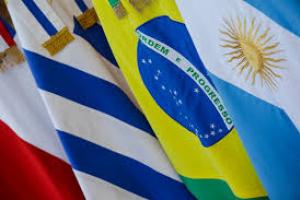Felipe Solá, the Argentine Minister of Foreign Relations:
"This year the Southern Common Market (Mercosur) celebrates 30 years since it was founded through the signing of the Treaty of Asunción in 1991. Mercosur is a historic achievement of the countries that make it up, which has allowed us to move from a logic of rivalry to one of co-operation.
The bloc was born in a climate of a return to democracy in Latin America, and from the outset, our countries saw it as a central tool for regional co-operation in order to leave behind the danger of dictatorships and de facto governments. Our governments understood that the removal of barriers in our region would be important to improve our economic well-being and also to eliminate the hypotheses of conflict that previously existed between some of our countries, through a comprehensive process of mutual confidence building.
Co-operation within Mercosur extended to many areas: culture, education, science and technology, confidence-building in defence and nuclear energy development (a fundamental aspect in the 1980s), the construction of a common citizenship, co-ordination of social and economic policies, and so on. The areas of joint work in the bloc are many and varied and are changing as changes in the international context and in the context of our countries so require.
Beginning in 1991 we created a free trade zone for our goods and services to move without restrictions, and also a common external tariff to manage trade with the rest of the world. This allowed our mutual trade to grow vigorously.
We also managed to promote an exchange of value-added products among our members, which allowed us to boost non-traditional export activities that create quality jobs (biofuels, chemicals and petrochemicals, plastics, pharmaceuticals, iron and steel, automotive, among others).
Indeed, while Mercosur countries are traditionally strong exporters of primary products, many of the exports that take place among the bloc’s members are industrialised products, with automotive trade standing out (almost 50 per cent of trade between Argentina and Brazil).
In public health, co-ordination among our countries has always been important, and even more so during the current covid19 pandemic. Our citizens can also settle in another country of the bloc and work freely and easily, something that is not common in the rest of the world.
In 2004 we created the Mercosur Structural Convergence Fund, through which more than US$1 billion in non-refundable loans for infrastructure and productive development projects, among others, have been disbursed to date, which has allowed us to increase the competitiveness of our economies and improve our living conditions, especially in the most backward areas of our countries.
On the other hand, since its early years, Mercosur has sought trade agreements with all the countries in the region, which has allowed it to build a free trade area with most of the countries of Latin America. We have also negotiated trade agreements with the European Union, the European Free Trade Association (EFTA), Israel, Egypt, India, southern African countries, among others. Mercosur is not a bloc closed to foreign trade, but a platform for our countries to project themselves to the rest of the world.
We believe that the meaning of integration is to seek agreements, by respecting the diversity of our countries. Even if we think differently on certain issues, ultimately it is the will to want to integrate our common agenda that prevails. Our countries promote regional solidarity in political, economic and social matters because we know that facing difficulties together makes us stronger.
Mercosur is the most important foreign policy instrument of the last 30 years for our countries. It is, in short, a state policy that has been preserved beyond changes in government. In these 30 years we have achieved many commonalities: the commitment to democracy as a fundamental condition for the life of our peoples; respect for human rights as an essential and inalienable value for coexistence; the recognition of our diversity; the co-ordination of our growth policies to integrate our productive structures. This is a job we must continue to do day by day, so that in 30 years’ time we can look back, as we do now, and be proud of what we have built.
The world is experiencing a reconfiguration of the global power structure, along with a crisis of the international institutions that have governed us for the past 70 years. In the face of the challenges and uncertainties posed by this scenario, we have no doubt that the integration of our countries will continue to be the best way to boost our development, preserve our sovereignty and promote the well-being of our peoples. All power is weak unless it remains united."
#Mercosur #Mercosul #ArgentinaIndia #IndiaArgentina #Argentina #Brasil #Paragay #Uruguay


